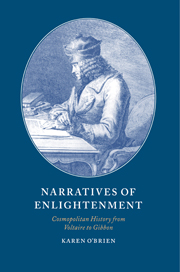Book contents
- Frontmatter
- Contents
- Acknowledgements and author's
- 1 Introduction: cosmopolitanism, narrative, history
- 2 Voltaire's neoclassical poetics of history
- 3 European contexts in Hume's History of England
- 4 William Robertson to the rescue of Scottish history
- 5 Robertson on the triumph of Europe and its empires
- 6 Emulation and revival: Gibbon's Decline and Fall of the Roman Empire
- 7 David Ramsay's sceptical history of the American Revolution
- Afterword
- Bibliography
- Index
- CAMBRIDGE STUDIES IN EIGHTEENTH-CENTURY ENGLISH LITERATURE AND THOUGHT
1 - Introduction: cosmopolitanism, narrative, history
Published online by Cambridge University Press: 28 October 2009
- Frontmatter
- Contents
- Acknowledgements and author's
- 1 Introduction: cosmopolitanism, narrative, history
- 2 Voltaire's neoclassical poetics of history
- 3 European contexts in Hume's History of England
- 4 William Robertson to the rescue of Scottish history
- 5 Robertson on the triumph of Europe and its empires
- 6 Emulation and revival: Gibbon's Decline and Fall of the Roman Empire
- 7 David Ramsay's sceptical history of the American Revolution
- Afterword
- Bibliography
- Index
- CAMBRIDGE STUDIES IN EIGHTEENTH-CENTURY ENGLISH LITERATURE AND THOUGHT
Summary
This is a study of cosmopolitan approaches to the past in the work of five eighteenth-century historians, and it is concerned with their endeavours to modify or transform their readers' sense of national self-awareness through the writing of narrative history. Three of these historians, Voltaire, Hume and Gibbon, are familiar, and familiarly grouped together. The fourth, William Robertson, the Scottish historian of Scotland, Europe and its empires, was once celebrated as much as his friend David Hume, and has, after a period of neglect, received a good deal of scholarly attention in recent years. The fifth, the American historian David Ramsay, needs more introduction; he was the most talented and, also, the most sceptical of the early patriot historians of the American Revolution, and he is included in the present book because his work exemplifies the peculiar difficulties and rewards of a cosmopolitan approach to a story of national self-invention. Each historian is considered in the national and cultural contexts within which the cosmopolitan perspectives of his work acquired and tendered meaning. Robertson is accorded two chapters in view of the number and diversity of his works, and the relative shortage of secondary material about them. Narratives of Enlightenment has no teleological tale to tell about the rise of a historicist outlook in eighteenth-century history or the triumph of an Enlightenment meta-narrative of progress.
- Type
- Chapter
- Information
- Narratives of EnlightenmentCosmopolitan History from Voltaire to Gibbon, pp. 1 - 20Publisher: Cambridge University PressPrint publication year: 1997

